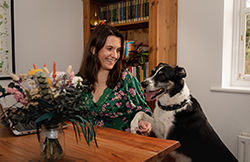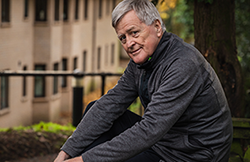
Life with an ICD: "It took quite a bit of getting used to"
Elizabeth Sanderson has had to deal with mixed emotions since having her ICD fitted. Hear how the device has become her “failsafe”.


Elizabeth Sanderson, 42, was a keen athlete before she collapsed in a field near her Halifax home when out running a few days before Christmas 2016. She was taken to hospital where she was diagnosed with ARVC, a condition that causes heart rhythm problems and increases her risk of cardiac arrest.
Elizabeth was fitted with an ICD (implantable cardioverter defibrillator) before she went home. She describes her ICD as her “failsafe”, but it hasn’t been easy.
She says: “Getting used to the ICD took quite a bit of doing. I felt anxious at first and was aware of every missed heartbeat.” She has had several shocks from her ICD in the five years since having it fitted, each time when her heart went into a dangerous rhythm.
Getting used to the ICD took quite a bit of doing. I felt anxious at first.
During that time, she has had to deal with different emotions, including anxiety, loss of confidence, and guilt. She says: “One of my biggest worries, when my heart is in a dangerous rhythm, is that the ICD won’t fire when I need it,”
Want to get fit and healthy?
Sign up to our fortnightly Heart Matters newsletter to receive healthy recipes, new activity ideas, and expert tips for managing your health. Joining is free and takes two minutes.
I’d like to sign upElizabeth also says she feels guilty for having to limit the things she can do with the people she cares about, turning down hillier walks with friends and not playing sports as she used to with her children.
- Get support with anxiety if you have a heart condition
She says her friends and her husband Nick have helped her come to terms with the emotional challenges of living with an ICD. “They’ve been an immense support, and Nick has listened to my thoughts and feelings over many an evening.”
Elizabeth also says getting help from a psychologist gave her positive ways to cope. “People talk so much about it being your guardian angel – but equally there’s that worry that you are completely reliant on it. In September 2017 I had three shocks, and after that my consultant referred me to a cardiology psychologist. It was very helpful, very freeing and I could unburden my feelings.
I felt I’d lost who I was. Because I used to run obsessively and now I didn’t even run. So what would I even talk to people about? Running used to be my identity and I didn’t want a heart condition to be my identity.
The psychologist helped me think through what gave me joy and purpose. I realised part of the joy of running was overcoming a challenge. So she helped me break it down and find other ways that I could achieve that. For example, she suggested I think about my favourite routes and got me to see I could walk them and appreciate them differently.
She talked about it as a grief and a loss. And seeing it in those terms helped a lot. It meant I was able to talk to my husband in a different way. Especially the grief angle – it isn’t a problem I can fix, it’s something I have lost. And Nick could then help me come to terms with it. I’ve found things I can do that I enjoy – I’m still out all the time in the countryside I love.”
Hear more inspiring ICD stories
 |
Learning to see the positives
“It does feel like I’ve had some special enhancement to make me more robust.” Read Becky's story |
 |
Connecting with others like me “I joined a sudden cardiac arrest survivors’ group so I could have other people to talk to.” Read Mike's story |
Updated 21 March 2022
What to read next...
Adjusting to life with an ICD


